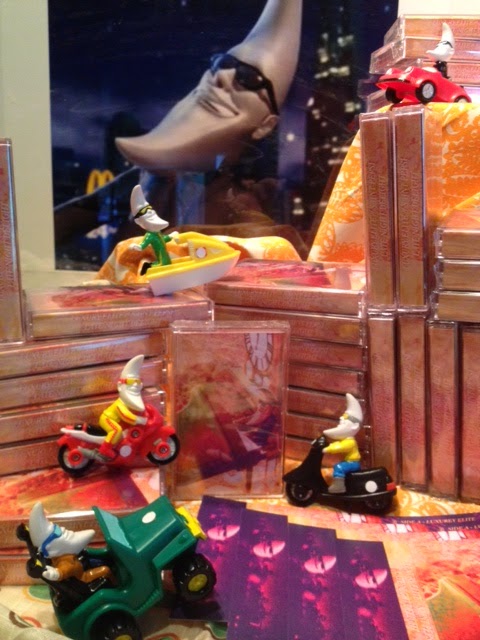Photo by Andrew Volk
Apologies for the delay - the second System Focus for the Fader is out (click here to see it) and it's based around a series of interviews with some labels in the online underground: Illuminated Paths, Ailanthus, 1080p, Zoom Lens, Dopefish Family and Aural Sects. This one was a real pleasure to put together, as I got to learn about how things work behind the scenes at some of my favourite labels on the emerging frontiers of underground operation, and discovered a real community.
You might have expected [the growth of the internet] to make labels—whose role it usually is to organise the discovery, representation, manufacturing and distribution of their artists’ music—redundant in the modern era. And as a result, you might have expected music producers and their listeners alike to be reduced to an atomised population of lone computer-clickers. But curiously, labels are flourishing, and they form key nodes in a new form of DIY musical culture that is as sociable as ever. How did these online labels form and who’s behind them? How do they work, and what drives them?...
The folks behind Aural Sects (image by Micah Clark)
One of the things that kick-started my curiosity about this new class of labels was when I received a box from Florida. It had been packed by Josh Rogers, the current manager of the Illuminated Paths label. As well as several cassettes (including a reissue of LATE NIGHT DELIGHT by Luxury Elite and Saint Pepsi, one of the key vaporwave albums), it contained a map of Historic Downtown Melbourne, FL, a State Farm Insurance keychain, a Lucky Charms straw, a section of a t-shirt from the Bluewater Network, a newspaper called Pet Gazette (featuring the cover line “Your Valentine Pet is Right Before Your Eyes-LOOK Inside!”), a couple of off-brand Pogs (remember them?), a toy cow you can clip together, all kinds of flyers, and, best of all, an expansive bib for a restaurant called Captain Quackenbush: The Seafood Specialist, featuring an ecstatic cartoon lobster (who is, in turn, wearing a Quackenbush bib). Not the sort of thing you find in England, where I’m based. Rogers often mails off cassettes with, as he puts it, “local and abroad ephemera from my travels and otherwise” included...
LATE NIGHT DELIGHT cassettes, care of Illuminated Paths
“We made secret, closed and public Facebook groups wherein we actively
developed brand new cultural signifiers for our new community. Each and
every one of us was doing something completely different from the next
and we were all coming from such vastly different backgrounds, cultures,
generations, class, etc. Collaboration was key, we all supported one
another and that naturally lead to collaborations, cross country
meet-ups, labels, websites, web concerts, we started doing whatever we
wanted. The community is different for everybody, but it means a lot to
everybody.”...
Zoom Lens art
The Zoom Lens label goes even further with the net-based ideology than Aural Sects, emblazoning its Bandcamp page with the legend “WE ARE A LABEL AND COLLECTIVE OF MUSICIANS. HUMANITY ACROSS THE DIGITAL DIVIDE. DIGITAL PUNK ROCK SPIRIT. FUCK REAL LIFE.” Today, the label has a clear Japanese-influenced aesthetic of sweetness and dreaminess, with joyous 8bit from Yasumiyasumi and Slime Girls, and gentle pop from Yoshino Yoshikawa, Yeule and i-fls, bittersweet like a green tea latte on a rainy Sunday afternoon... the Japanese connection “has given Zoom Lens its sense of ‘punk rock’ aesthetics. To enjoy anime in the United States is punk rock. To listen to J-Pop is punk rock.”...
Dopefish Family's Andrei Mitroshin
Many of these labels manifest IRL by releasing on physical formats, of course. For most online labels, that means mail. “Oh man, so much mail,” says 1080p’s MacFarlane. “These days I’ll go once or twice a week down to the post office in Chinatown on my way to school, where I’m on very good terms with the ladies who work there.” But it doesn’t work everywhere: “Russian post is bloody hell,” says Mitroshin of Dopefish Family. “So all physical stuff we make (or will make) goes only with our friends or people that can reach us here.” MacFarlane is fond of cassettes, though: “The physical practicality of them, they are nice and small to post, cheaper and lower risk to manufacture than vinyl and I’ve always had cars with tape decks.” They’re also “like a more casual place to experiment than vinyl that can be released reasonably quickly.”
1080p's Richard MacFarlane
Garrett hopes the label can “move into the direction of digitally tangible releases or limited art pieces. I feel like the existence of physical items is important in preserving our own attached memories to such listening experiences, yet sometimes I feel like it’s impractical in an ecological sense and is slowly growing less acceptable for the shifting musical listening trends.” Then, elegantly and poignantly echoing Zoom Lens’s sonic and visual aesthetic: “We are in constant conflict in losing the physical things that bring us a sense of connection, yet we enjoy the ease of instant gratification.” Ailanthus’s Michael confesses, “I always wonder where these files will be in decades, like what if kids go to thrift stores and rummage old external hard drives for rare internet music.”









